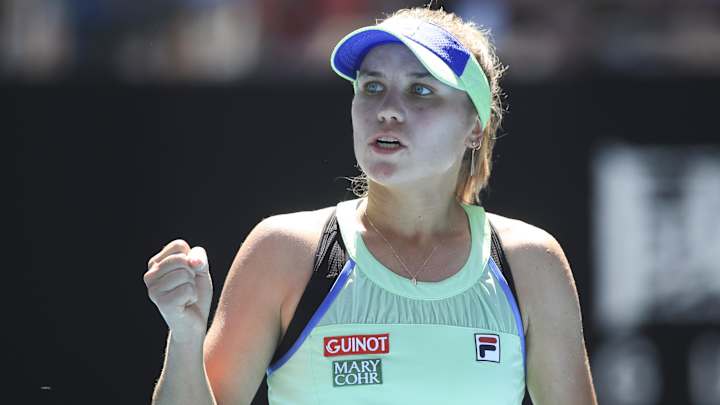Djokovic Defeats Federer, American Sofia Kenin Reaches 2020 Australian Open Final

MELBOURNE – Often as we talk in terms of backhands, forehand serves, there are other, less easily quantified tennis gifts. Take relentlessness, which was the theme of the day on Thursday at the 2020 Australian Open. Two women and one (super)man won their semifinals matches simply with a refusal to be the second-best player on the court.
• Sonia Kenin got the day started not so much by winning, but by defiantly refusing to be beaten. The 21-year-old Floridian, seeded 14, outlasted Ash Barty, the top seed, thereby extinguishing Australia’s hope of furnishing its first homegrown champion since the 1970s. Kenin might stand just 5’6”, but she has held serve at a better rate than another player in the women’s draw this event. Beyond that, she gives no quarter, relishing the battle and playing her best when, by all rights, she ought to be tightening. In a brutally hot day and in front of a frosty crowd, Kenin staved off set points and won the first set in a tiebreaker. She did the same in the second set, battling through set points serve and playing the steadier tennis to win the match 7-6(6), 7-5. Apart from reaching her major final, Kenin gets this bonus: she is now all but assured of making the U.S. Olympic team.
• Garbine Muguruza has long represented one of tennis’ great mysteries, a player profoundly talented who plays peek-a-boo with her results. Last year—notionally, in the prime of her career—she won zero tournaments, lost in the first round of Wimbledon and the U.S. Open, and finished outside the top 30. This year, under new coach Conchita Martinez, she has played like the future Hall of Famer she is. On Thursday, in kiln-like conditions, she answered all manner of questions, winning gallantly over Simona Halep in a physical match, 7-6(8), 7-5. Muguruza is an A-list athlete and a booming ball-striker. She was stingy with her errors in the tightest games and mounted comebacks in both sets. “In the important moments she played a little bit more braver,” said Halep. “I won't do a drama. But it hurts.” As for Mugu, she was philosophical in victory. “I never thought I was down. I was thinking, Keep going and, at some point, you’re going to have your opportunity…I was hanging in there and fighting with all the energy I had.” It applied today. And it applied more cosmically.
• In the nightcap, Roger-Novak L, the 50th encounter between Roger Federer and Novak Djokovic. Showing few signs of the groin injury that gave him trouble two days ago against Tennys Sandgren, Federer dominated the first half hour and was up 5-2. But after a long taxi, Djokovic finally took off and began playing like, well, Novak Djokovic, the seven-time Aussie Open champ. Djokovic stole the first set in the tiebreaker. He tidied up his affair and won the second set 6-4. Then the decider, 6-3. One more match—against the Dominic Thiem/Alexander Zverev winner—and he could his eighth title here, his 17th major and reclaim the top ranking.
• Having lost a bet (long story), I was made to write a poem about the match. Here’s the effort:
Two tennis stars would play
On concrete, grass, indoors and clay
They’d meet 49 times
In all countries and climes
And each time history would weigh
The stakes of these matches? Well, plenty
Stakes? Sizes: tall, grande and venti
With results contradictory
Sometimes, one point from victory
And the majors count? Sixteen to 20.
For all the chapters and all the stages
They’d write a book of considerable pages
On a 12-year Aussie-versary
They now need a nursery
Six kids among them, ranging in ages.
On Thursday night, it was hot as hell
After starting shakily, the Serb answered the bell
Don’t mean to trouble you
But Novak’s great double-U
Meant that Match 50 was Roger’s L.

Jon Wertheim is a senior writer for Sports Illustrated and has been part of the full-time SI writing staff since 1997, largely focusing on the tennis beat , sports business and social issues, and enterprise journalism. In addition to his work at SI, he is a correspondent for "60 Minutes" and a commentator for The Tennis Channel. He has authored 11 books and has been honored with two Emmys, numerous writing and investigative journalism awards, and the Eugene Scott Award from the International Tennis Hall of Fame. Wertheim is a longtime member of the New York Bar Association (retired), the International Tennis Writers Association and the Writers Guild of America. He has a bachelor's in history from Yale University and received a law degree from the University of Pennsylvania. He resides in New York City with his wife, who is a divorce mediator and adjunct law professor. They have two children.
Follow jon_wertheim